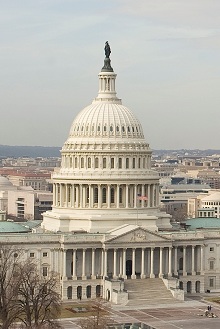
The machinations of the Joint Select Committee on Deficit Reduction (the so-called “supercommittee”) have seemingly mystified the media.
While not hermetically sealed, the transactions of the 12 JSC members have been very difficult to chronicle accurately. It might be useful, then, to take a step back and look at the JSC, its formation, and the preferences of the two parties.
Remember how we got here. A certain kind of insanity spread through the Congress in early summer. Many Republicans said that they wouldn’t vote for an increase in the federal debt ceiling under any circumstances. Many Democrats said they sure as heck weren’t going to bail the Republicans out by voting for an increase, either. It resembled something like a pre-school sandbox at recess.
Republicans then opted for the old “Balanced Budget Amendment to the Constitution” dodge. Democrats countered with “The-road-to-ruin-is-covered-with-the-bodies-of-old-folks-that-Republicans-have- killed” maneuver.
Remember how we got here. A certain kind of insanity spread through the Congress in early summer … It resembled something like a pre-school sandbox at recess.
Someone then noticed that the really and truly and not kidding deadline for passing an increase in the debt ceiling was in early August. In order to pass an increase, the Budget Control Act, which established the JSC among other provisions, emerged. It contained a provision for a Balanced Budget Amendment vote. It also contained $917 billion in spending cuts, over a decade, in discretionary, appropriated accounts, which comprises a small percentage of federal spending.
And, above all, it did not mention those two words which cannot be uttered (with apologies to J.K. Rowling) – taxes and Medicare.
What do the two party caucuses want? First, they individually want to be re-elected. Second, as a necessary corollary to the first point, they don’t want to unilaterally disarm before the 2012 elections. If fiscal sanity is a by-product of the two imperatives above, well, great. If not, well, maybe next Congress.
So, Democrats figure that they have this great cudgel called “Medicare,” and that they will be able to regain the House, defend the Senate, and keep the White House with this cudgel.
Republicans think they have this great bludgeon called “taxes,” and that they will defend their majority in the House, take over the Senate, and win the White House with this bludgeon.
All pretense of “negotiating a settlement” has long vanished from the Administration. The President merrily paints the Republicans as plutocrats, handmaidens of Wall Street, sycophants for Big Oil, and heartless millionaires. The real White House no longer occupies 1600 Pennsylvania Avenue. Rather, it is located in Chicago, where the re-election campaign is based.
The real White House no longer occupies 1600 Pennsylvania Avenue. Rather, it is located in Chicago, where the re-election campaign is based.
The result of the first 11 months of this year? Congress has a 9 percent approval rating. Roughly three-quarters of respondents to polls believe the nation is headed toward wreck and ruin. And international observers wonder if America’s governing class has simply become unhinged.
The federal budget solution is very clear and simple. That’s why it is hard. It is difficult to hedge and trim about what has to be done.
Fiscal sanity requires three things — economic growth, fundamental reform of entitlements, and a pro-growth reform of the tax code that yields increased revenues.
The Bipartisan Policy Center’s Debt Reduction Task Force (the so-called Domenici-Rivlin group) has produced such a plan. So, too, did the Simpson-Bowles Presidential Commission. Other organizations have also produced well-thought-out blueprints. Realistically, although it certainly has the power to do so, the JSC is very unlikely to take steps to implement any of these fiscal plans. In all likelihood, the JSC will come up with the mandated $1.2 trillion in deficit reduction and pass the mess on to the House and Senate for final passage. Much of the deficit reduction may be real, some phony, and some concocted by baseline adjustments.
None of it, just like that $917 billion in cuts contained in the BCA, will change the debt trajectory of the nation to any significant degree. Demographics will still pour tens of millions of new Social Security and Medicare recipients onto the rolls. Funding for things that provide for a strong future — education, transportation, health research, security spending, science — will continue to take the brunt of fiscal restraint.
In all likelihood, the JSC will come up with the mandated $1.2 trillion in deficit reduction and pass the mess on to the House and Senate for final passage. Much of the deficit reduction may be real, some phony, and some concocted by baseline adjustments. None of it, just like that $917 billion in cuts contained in the BCA, will change the debt trajectory of the nation to any significant degree.
In short, the BCA and the likely product of the JSC will prod the nation along the same path of “eating our seed corn.” Investments in the future will yield to current consumption. The outcome will reveal once again how hard it is for humans to forego current pleasure for long-term gain.
At the present rate, America’s national debt will hit 100 percent of forecast Gross Domestic Product shortly. In another 15 years, it will near 200 percent of GDP. And, like a hyperbolic curve, it will rush towards 300 percent in subsequent decades.
Will that happen? Of course not. Investors won’t continue to lend to a nation with that debt profile. In order to bring some fiscal order in the future, rapid and severe cuts in spending and increases in taxes, along with further depreciation of the currency, must occur. The pain will be enormous and have serious economic consequences.
If the Congress and the JSC fail to confront this reality now — when the changes are reasonably easy and can be phased in over time — then this inaction will bring the nation to a fiscal cliff. As even some members of the JSC said recently, “This is the easiest to predict looming disaster of all time.”
Rigid ideology on both sides, a political polarization unseen in this country in more than 40 years, may doom the nation and the dollar to a much lesser status. If so, the political leaders of this era will go down in history with justly-earned blackened reputations.
Steve Bell is Senior Director of the Economic Policy Project at the Bipartisan Policy Center. He is a longtime aide to former Senator Pete Domenici, serving as the Senator’s Chief of Staff and as the Staff Director of the Senate Budget Committee, which Senator Domenici chaired.




